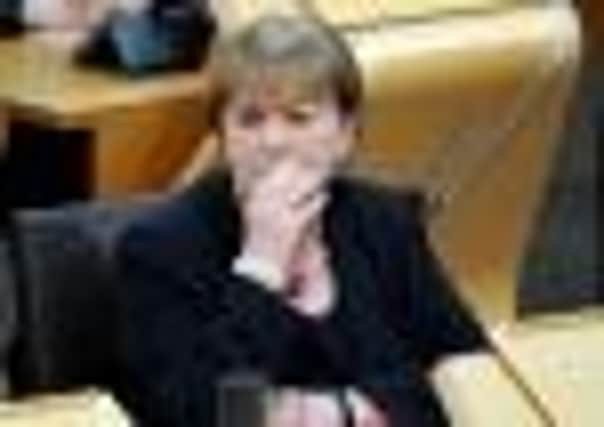Johann Lamont: Salmond putting Scotland on pause


Labour leader Johann Lamont levelled the charge at Alex Salmond before the announcement of the referendum date.
Advertisement
Hide AdAdvertisement
Hide AdOrdinary people are suffering while Mr Salmond is “concentrating on his obsession” of independence, she claimed.
Prior to Mr Salmond revealing the date of the historic ballot in a statement to MSPs, Ms Lamont said people would “find out how long Scotland has to remain on pause while he tries to sell Scots a deal which Scotland rejects”.
Obsession
She said: “What we have now is Scotland on pause, a Scotland with 120,000 fewer students in colleges, a Scotland with pensioners languishing on trolleys in hospital corridors, a Scotland suffering from Tory cuts which the First Minister doubles and passes on to our communities.
“When Scotland rejects him, how will the First Minister explain to the student, the pensioner and the patient why he wasted so many years concentrating on his obsession and not on their needs?”
Mr Salmond responded by attacking Labour while defending his administration’s record.
“In terms of the health service, we have guaranteed and delivered real-terms spending for the health service in Scotland, something which would not have been done by the Labour party if they had come to power in Scotland and was not done by the Labour party in Wales.”
Westminster constraints
He highlighted the “important reduction” in the youth unemployment rate, from just under 25% to 17%.
That is still “far too high” but is nevertheless a “dramatic improvement over the last year”.
Advertisement
Hide AdAdvertisement
Hide AdThe ability of the Scottish Government is constrained because Westminster still determines how much cash it has to spend, describing this as “the basic challenge of Scottish politics”.
Turning on Labour, he said the party abstained in a vote on workfare in the House of Commons and abstained in votes on Trident and the Iraq war in Holyrood.
“What Scotland needs is a government that doesn’t abstain but takes control of Scotland and takes us forward into a prosperous and just future,” Mr Salmond said.
Increased spending power
The First Minister has also rejected the UK Government position that Scotland will have increased spending power and warned there will be an impact on key services.
“Far from there being an increase, there was a £50 million cut in this coming financial year where budgets have already been set for the health services, across the agencies, for police, for fire, for local government; a £50 million cut in this financial year as a result of what the Treasury was doing by sleight of hand,” he said.
After the Budget was announced at Westminster, the UK Government’s Scotland Office announced “additional spending power of £176 million over the next two years” for the Scottish Government.
It led to calls for Finance Secretary John Swinney to start spending cash on long-awaited projects such as the Aberdeen city bypass.
£107 million of resources taken
But he complained that the Chancellor took £107 million of resources planned for running services over two years and offered £266 million in loan and equity facilities over which he has no discretion.
Advertisement
Hide AdAdvertisement
Hide AdThe loans are essentially to help people buy houses and cannot be used to fulfil other aspirations such as infrastructure improvements, he warned.
Taking into account additional payments, it amounts to a £90.7 million “hard-cash” cut, Mr Swinney said.
Mr Salmond, speaking at First Minister’s Questions, said: “Will the Conservative party join with us in saying it’s not a good idea to cut £50 million this coming year, £90 million over the next two years, of hard cash in terms of the Scottish budget which has already been allocated to spending departments around the country?
“Or will Ruth Davidson come forward with suggestions that her party are going to make for where these cuts are going to be found?”
Ms Davidson, the Scottish Conservative leader, said the additional UK allocations, made by combining £279 million in capital spending with a £103 reduction in day-to-day resource spending, equals more money.
Challenging Mr Salmond, she asked: “However much the First Minister complains now, however much John Swinney complained yesterday, if you add revenue and capital together, there was £176 million that came to Scotland yesterday as a result of that Budget.”
The Scottish Government already has money for loans and equity, which ministers have praised as “good news”, she said.